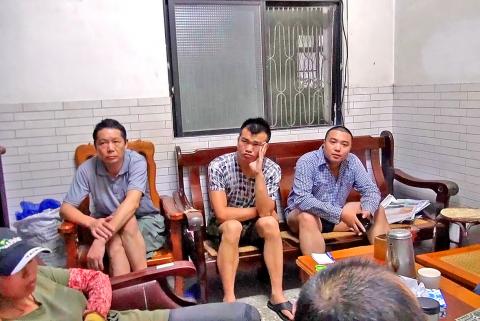Investigators in central Taiwan have uncovered an unusual case of alleged Chinese industrial espionage that targeted the agricultural sector after arresting four Chinese men working illegally on tea farms in Nantou County. The case is said to be the first one in which social media were used to gather information about the nation’s tea industry.
Officials at the Nantou County Investigation Bureau confirmed yesterday that they arrested four Chinese men, who were hired as “tea pickers” to harvest tea by hand on mountain farms around Nantou’s Jhushan Township (竹山).
The men are suspected of recording their farm work and tea processing techniques with smartphone cameras.

Photo: Copy by Chen Feng-lee, Taipei Times
The head of the group, surnamed Zhou (鄒), allegedly sent the photographs and information via social messaging app Line to a tea company in China’s Fujian Province which had hired him as a spy.
When questioned by investigators, Zhou allegedly admitted that he was hired by the Fujian tea company, which had contacts to place Chinese workers on contract jobs at Nantou’s tea farms.
“I was told to gather top-grade tea samples, learn the tea processing technique and get to know some tea farmers. This information, which they will use for their future tea processing and trading business, was recorded and sent to China using Line,” Zhou reportedly said.
Authorities said photographs were found on Zhou’s phone of tea farms in the mountainous tea-producing regions of central Taiwan, including Alishan (阿里山), Dayu Mountain (大禹嶺), Lugu (鹿谷) and Shanling Creek (杉林溪).
Officials said three of the four men came to Taiwan after applying for visas to visit relatives and were working illegally.
“It may not be so simple. Maybe they had political aims and also undertook other spying activities,” one of the investigators said.
He referred to Zhang (張), one of the four arrested, whose case hinted at a possible Chinese espionage penetration plan going back nearly two decades.
According to the investigator, Zhang, 51, divorced his Chinese wife surnamed Chen (陳) 17 years ago, which enabled her to marry an elderly retired soldier in Taiwan.
The retired soldier died 10 years ago, after which Chen inherited his monthly pension of NT$40,000 (US$1,316). Chen then returned to China to remarry Zhang, her original husband.
This enabled Zhang to come to Taiwan as her spouse and through Chen become eligible to work and live in Taiwan.
Officials suspect Zhang is the key liaison person in the operation, specializing in contacting and hiring Chinese men to work on tea farms in Taiwan.

ENDEAVOR MANTA: The ship is programmed to automatically return to its designated home port and would self-destruct if seized by another party The Endeavor Manta, Taiwan’s first military-specification uncrewed surface vehicle (USV) tailor-made to operate in the Taiwan Strait in a bid to bolster the nation’s asymmetric combat capabilities made its first appearance at Kaohsiung’s Singda Harbor yesterday. Taking inspiration from Ukraine’s navy, which is using USVs to force Russia’s Black Sea fleet to take shelter within its own ports, CSBC Taiwan (台灣國際造船) established a research and development unit on USVs last year, CSBC chairman Huang Cheng-hung (黃正弘) said. With the exception of the satellite guidance system and the outboard motors — which were purchased from foreign companies that were not affiliated with Chinese-funded

PERMIT REVOKED: The influencer at a news conference said the National Immigration Agency was infringing on human rights and persecuting Chinese spouses Chinese influencer “Yaya in Taiwan” (亞亞在台灣) yesterday evening voluntarily left Taiwan, despite saying yesterday morning that she had “no intention” of leaving after her residence permit was revoked over her comments on Taiwan being “unified” with China by military force. The Ministry of the Interior yesterday had said that it could forcibly deport the influencer at midnight, but was considering taking a more flexible approach and beginning procedures this morning. The influencer, whose given name is Liu Zhenya (劉振亞), departed on a 8:45pm flight from Taipei International Airport (Songshan airport) to Fuzhou, China. Liu held a news conference at the airport at 7pm,

Taiwan was ranked the fourth-safest country in the world with a score of 82.9, trailing only Andorra, the United Arab Emirates and Qatar in Numbeo’s Safety Index by Country report. Taiwan’s score improved by 0.1 points compared with last year’s mid-year report, which had Taiwan fourth with a score of 82.8. However, both scores were lower than in last year’s first review, when Taiwan scored 83.3, and are a long way from when Taiwan was named the second-safest country in the world in 2021, scoring 84.8. Taiwan ranked higher than Singapore in ninth with a score of 77.4 and Japan in 10th with

GRIDLOCK: The National Fire Agency’s Special Search and Rescue team is on standby to travel to the countries to help out with the rescue effort A powerful earthquake rocked Myanmar and neighboring Thailand yesterday, killing at least three people in Bangkok and burying dozens when a high-rise building under construction collapsed. Footage shared on social media from Myanmar’s second-largest city showed widespread destruction, raising fears that many were trapped under the rubble or killed. The magnitude 7.7 earthquake, with an epicenter near Mandalay in Myanmar, struck at midday and was followed by a strong magnitude 6.4 aftershock. The extent of death, injury and destruction — especially in Myanmar, which is embroiled in a civil war and where information is tightly controlled at the best of times —